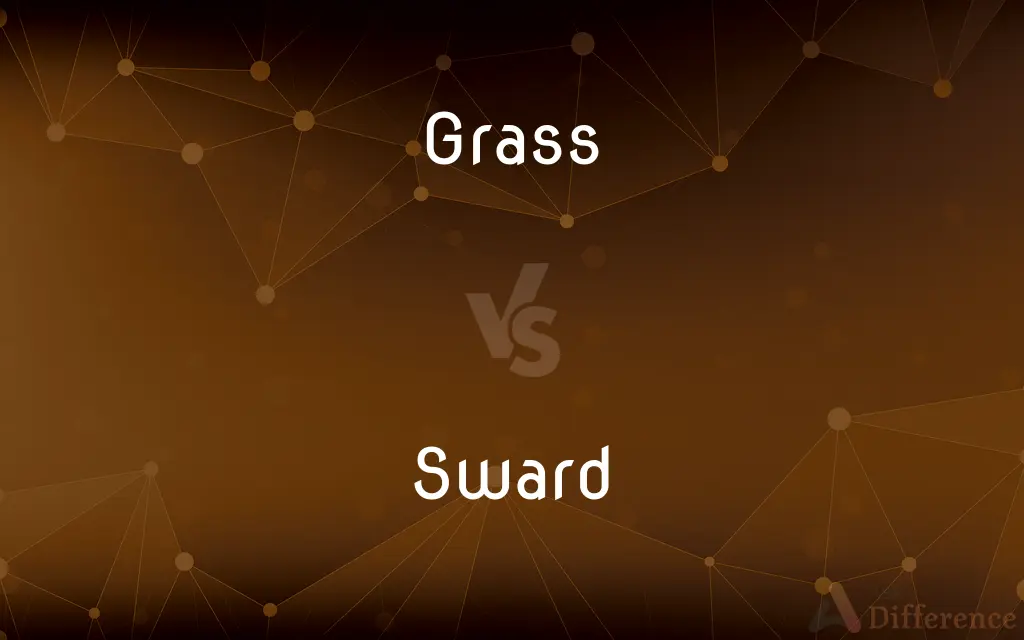Grass vs. Sward — What's the Difference?
By Tayyaba Rehman & Maham Liaqat — Updated on April 3, 2024
Grass is a single species or variety of green, leafy plants, commonly found in lawns and fields, while sward refers to a stretch of land covered with grass, often forming a dense, uniform layer.

Difference Between Grass and Sward
Table of Contents
ADVERTISEMENT
Key Differences
Grass is a term used to describe individual species or varieties within the Poaceae family, which includes plants characterized by narrow leaves growing from the base. On the other hand, sward encompasses the collective appearance of a land area densely covered by grass or a similar vegetation, presenting a continuous, uniform layer.
While grass may refer to both wild and cultivated species that are found across various ecosystems, sward specifically denotes a well-established, often manicured, grassy surface, such as those found in parks, lawns, and pastures. Whereas sward implies a certain level of maintenance and uniformity, suggesting a landscape that has been intentionally cultivated or naturally grown to form a dense mat.
Grass species can vary widely in height, color, texture, and growth habits, catering to different environmental conditions and uses. Sward, however, represents the collective outcome of these species growing together, offering a more homogenous and often aesthetically pleasing view. This distinction highlights the individualistic nature of grass versus the communal aspect of sward.
The maintenance required for grass depends on the specific species, with some needing frequent mowing, watering, and fertilization to thrive. In contrast, a sward, as a cohesive unit, requires maintenance practices that ensure the health and uniformity of the entire area, which might include pest control, aeration, and regular trimming to maintain its characteristic appearance.
In terms of ecological function, grass plays a crucial role in soil erosion prevention, carbon sequestration, and providing habitat and food for wildlife. Sward, by encompassing a larger, more uniform area of grass, contributes to these ecological benefits on a broader scale, enhancing the landscape's overall biodiversity and stability.
ADVERTISEMENT
Comparison Chart
Definition
A single species or variety of green, leafy plants within the Poaceae family.
A stretch of land covered with grass or similar vegetation, forming a dense, uniform layer.
Scope
Individual plants or species.
A collective area of grass-covered land.
Maintenance
Varies by species; may require mowing, watering, and fertilization.
Requires maintenance for uniformity and health of the area; includes mowing, aeration, and pest control.
Ecological Function
Prevents soil erosion, sequesters carbon, provides habitat and food for wildlife.
Enhances biodiversity and stability on a broader scale, contributing similarly to ecological functions.
Aesthetic Aspect
Can vary widely in appearance based on species and care.
Offers a more homogenous and often aesthetically pleasing landscape.
Compare with Definitions
Grass
A plant belonging to the family Poaceae, characterized by narrow leaves.
The grass in our backyard needs mowing.
Sward
Requires uniform maintenance practices for health and appearance.
Regular mowing kept the sward looking pristine.
Grass
A term used for various species used in lawns and pastures.
Bermuda grass is popular in warmer climates.
Sward
A stretch of land covered with grass or similar vegetation, forming a dense layer.
The sward in the park was perfect for picnics.
Grass
Grass species vary in texture, color, and growth habit.
The ornamental grass added a unique texture to the garden.
Sward
Often refers to well-maintained, manicured grassy areas.
The golf course boasted a meticulously kept sward.
Grass
Wild or cultivated plants used for landscaping or fodder.
The farmer planted a new type of grass for his cattle.
Sward
Contributes to the ecological health of an area on a larger scale.
The extensive sward played a key role in local biodiversity.
Grass
Can be used in a metaphorical sense to describe fields or lawns.
The children played all day on the soft grass.
Sward
Represents a homogenous, aesthetically pleasing aspect of landscapes.
The sward around the castle created a stunning visual.
Grass
A member of the grass family.
Sward
Sward or Swärd may refer to: Christian Swärd (born 1987), professional Swedish ice hockey player Marcia P. Sward (1939–2008), American mathematician and nonprofit organization administrator Melinda Sward (born 1979), American actress known for her portrayal of Pretty Crane on the NBC daytime soap opera Passions Robert Sward (born 1933), American and Canadian poet and novelistSward can also refer to the dense vegetation of an area of grassland or meadow.
Grass
The members of the grass family considered as a group.
Sward
Land covered with grassy turf.
Grass
Any of various plants having slender leaves similar to those of a grass.
Sward
A lawn or meadow.
Grass
Ground, as on a lawn, that is covered with grass or similar plants.
Sward
(uncountable) Earth which grass has grown into the upper layer of; greensward, sod, turf; (countable) a portion of such earth.
Grass
Grazing land; pasture.
Sward
(countable) An expanse of land covered in grass; a lawn or meadow.
Grass
(Slang) Marijuana.
Sward
The upper layer of the ground, especially when vegetation is growing on it.
Grass
(Electronics) Small variations in amplitude of an oscilloscope display caused by electrical noise.
Sward
The rind of bacon or pork; also, the outer covering or skin of something.
Grass
Chiefly British Slang An informer.
Sward
(Philippines) A homosexual man.
Thesaurus:male homosexual
Grass
To cover with grass.
Sward
(transitive) To cover (ground, etc.) with sward.
Grass
To grow grass on.
Sward
(intransitive) Of ground, etc.: to be covered with sward; to develop a covering of sward.
Grass
To feed (livestock) with grass.
Sward
Skin; covering.
Grass
To become covered with grass.
Sward
The grassy surface of land; that part of the soil which is filled with the roots of grass; turf.
The sward was trim as any garden lawn.
Grass
To graze.
Sward
To produce sward upon; to cover, or be covered, with sward.
Grass
Any plant of the family Poaceae, characterized by leaves that arise from nodes in the stem and leaf bases that wrap around the stem, especially those grown as ground cover rather than for grain.
Sward
Surface layer of ground containing a matt of grass and grass roots
Grass
(countable) Various plants not in family Poaceae that resemble grasses.
Grass
(uncountable) A lawn.
Grass
Marijuana.
Grass
An informer, police informer; one who betrays a group (of criminals, etc) to the authorities.
What just happened must remain secret. Don't be a grass.
Grass
Sharp, closely spaced discontinuities in the trace of a cathode-ray tube, produced by random interference.
Grass
Noise on an A-scope or similar type of radar display.
Grass
The season of fresh grass; spring or summer.
Grass
That which is transitory.
Grass
Asparagus; "sparrowgrass".
Grass
(mining) The surface of a mine.
Grass
(transitive) To lay out on the grass; to knock down (an opponent etc.).
Grass
To act as a grass or informer, to betray; to report on (criminals etc) to the authorities.
Thesaurus:rat out
Grass
(transitive) To cover with grass or with turf.
Grass
(transitive) To feed with grass.
Grass
(transitive) To expose, as flax, on the grass for bleaching, etc.
Grass
(transitive) To bring to the grass or ground; to land.
Grass
Popularly: Herbage; the plants which constitute the food of cattle and other beasts; pasture.
Grass
An endogenous plant having simple leaves, a stem generally jointed and tubular, the husks or glumes in pairs, and the seed single.
Grass
The season of fresh grass; spring.
Two years old next grass.
Grass
Metaphorically used for what is transitory.
Surely the people is grass.
Grass
Marijuana.
Grass
To cover with grass or with turf.
Grass
To expose, as flax, on the grass for bleaching, etc.
Grass
To bring to the grass or ground; to land; as, to grass a fish.
Grass
To produce grass.
Grass
Narrow-leaved green herbage: grown as lawns; used as pasture for grazing animals; cut and dried as hay
Grass
German writer of novels and poetry and plays (born 1927)
Grass
Animal food for browsing or grazing
Grass
Street names for marijuana
Grass
Shoot down, of birds
Grass
Cover with grass;
The owners decided to grass their property
Grass
Spread out clothes on the grass to let it dry and bleach
Grass
Cover with grass
Grass
Feed with grass
Grass
Give away information about somebody;
He told on his classmate who had cheated on the exam
Common Curiosities
How do you maintain a healthy sward?
Maintaining a healthy sward involves regular mowing, aeration, watering, fertilization, and pest control to ensure uniformity and vitality.
What are the ecological benefits of grass?
Grass provides numerous ecological benefits, including soil erosion prevention, carbon sequestration, and habitat for wildlife.
Is sward always green?
Sward is typically green but can vary in shades depending on the grass species, health, and seasonal changes.
Can sward include plants other than grass?
While primarily composed of grass, sward can sometimes include other low-growing vegetation that contributes to the dense, uniform appearance.
Can any type of grass form a sward?
Yes, many types of grass can grow densely enough to form a sward, especially with proper maintenance.
Is it expensive to maintain a sward?
Maintenance costs for sward can vary, but it often requires investment in regular care practices to keep it healthy and aesthetically pleasing.
What is the main difference between grass and sward?
Grass refers to individual species or varieties within the Poaceae family, while sward is a stretch of land covered with a dense, uniform layer of grass.
Is sward suitable for all types of landscapes?
Sward is suitable for many types of landscapes, especially those seeking a uniform, aesthetically pleasing grassy area, but it requires suitable climate and maintenance.
Do all grass species require the same amount of maintenance?
No, grass species vary widely in their maintenance requirements based on growth habits, climate adaptability, and aesthetic goals.
How often should sward be mowed?
The mowing frequency for sward depends on the grass type, growth rate, and desired appearance, but it generally requires regular trimming to maintain uniformity.
How does sward contribute to the landscape's biodiversity?
Sward enhances biodiversity by offering a stable, uniform habitat that supports a variety of flora and fauna.
How does grass adapt to different climates?
Grass species have adapted to a wide range of climates, with certain varieties suited to specific temperature ranges, moisture levels, and sunlight exposure.
What makes a sward aesthetically pleasing?
A sward's uniformity, density, color, and texture contribute to its aesthetic appeal, making it desirable for parks, lawns, and recreational areas.
Can sward improve soil health?
Yes, a healthy sward can improve soil health by preventing erosion, promoting water infiltration, and enhancing soil organic matter.
Share Your Discovery

Previous Comparison
Stamina vs. Vitality
Next Comparison
Eschew vs. ForfeitAuthor Spotlight
Written by
Tayyaba RehmanTayyaba Rehman is a distinguished writer, currently serving as a primary contributor to askdifference.com. As a researcher in semantics and etymology, Tayyaba's passion for the complexity of languages and their distinctions has found a perfect home on the platform. Tayyaba delves into the intricacies of language, distinguishing between commonly confused words and phrases, thereby providing clarity for readers worldwide.
Co-written by
Maham Liaqat















































